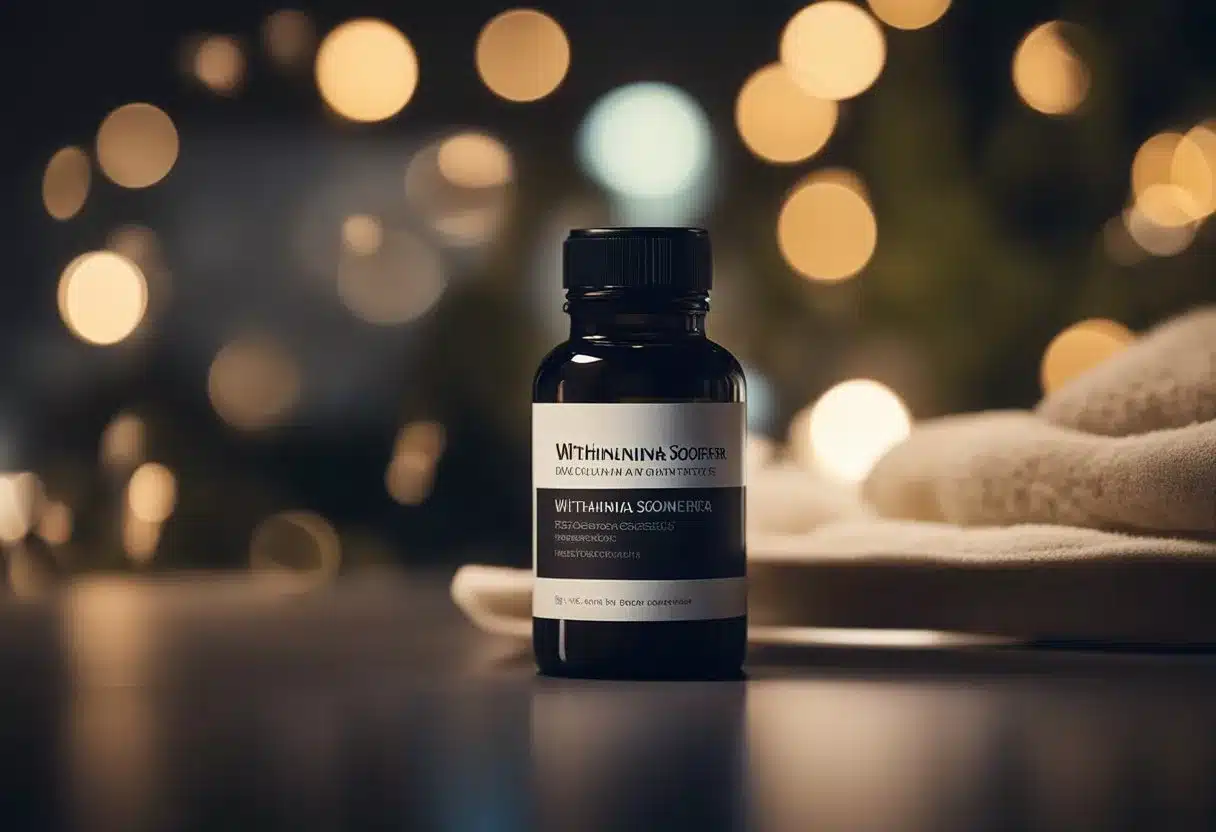Sleep troubles can be frustrating and impact daily life. Many people are turning to natural remedies like Withania somnifera, also known as ashwagandha, to improve their rest. This herb has been used for centuries in Ayurvedic medicine and is now gaining attention for its potential sleep benefits.

What to do before bed to sleep better:
Watch the video NOW!
Studies suggest that ashwagandha may help people fall asleep faster, stay asleep longer, and wake up feeling more refreshed. A randomized, controlled trial found that participants who took ashwagandha extract reported better sleep quality compared to those who took a placebo. The herb seems to work by reducing stress and anxiety, which are common causes of sleep problems.
Ashwagandha offers more than just sleep support. It may also boost energy levels, sharpen focus, and improve overall well-being. While more research is needed, early results are promising for those seeking a natural way to enhance their sleep.
Key Takeaways
- Ashwagandha may improve sleep quality and duration in some people
- The herb works by reducing stress and anxiety, common sleep disruptors
- Ashwagandha offers potential benefits beyond sleep, including increased energy and focus
The Science of Withania Somnifera

Withania somnifera, commonly known as ashwagandha, contains powerful compounds that affect sleep and stress. Research shows it can improve sleep quality and reduce anxiety through various mechanisms in the body.
Withanolides: Active Compounds in Ashwagandha
Withanolides are the key active ingredients in Withania somnifera. These naturally occurring steroids give the plant its medicinal properties. Studies have found over 35 different withanolides in ashwagandha.
The most researched withanolides include:
• Withaferin A • Withanolide A • Withanone
These compounds interact with neurotransmitter systems in the brain. They may increase GABA activity, which promotes relaxation and sleep.
Effect on Sleep and Anxiety Levels
Research shows Withania somnifera can improve overall sleep quality. It may help people fall asleep faster and sleep more soundly through the night.
In clinical trials, ashwagandha reduced anxiety levels in participants. Lower anxiety often leads to better sleep. The herb appears to work by lowering cortisol, a stress hormone that can interfere with sleep when levels are too high at night.
Ashwagandha may also boost mental alertness upon waking. This suggests it promotes restorative sleep rather than sedation.
Adaptogenic Properties and Stress Reduction
Withania somnifera is classified as an adaptogen. Adaptogens help the body resist and adapt to stress. They work to balance various systems and promote homeostasis.
As an adaptogen, ashwagandha can:
• Lower cortisol levels • Reduce inflammation • Support immune function • Improve energy and stamina
These effects allow the body and mind to better handle stress. Less stress often means improved sleep quality. By addressing the root causes of poor sleep, Withania somnifera offers a natural way to enhance rest and recovery.
Health Benefits Beyond Sleep

Withania somnifera, commonly known as ashwagandha, offers a range of health benefits beyond improving sleep quality. This herb has shown promise in enhancing cognitive function, reducing inflammation, and supporting healthy aging processes.
Cognitive Function and Mental Alertness
Ashwagandha may boost brain function and mental sharpness. Studies suggest it can improve memory, attention span, and information processing speed. The herb’s active compounds may protect brain cells from damage and promote the growth of new neural connections.
In some research, participants taking ashwagandha showed better reaction times and task performance compared to those taking a placebo. This cognitive enhancement could be particularly beneficial for older adults or those experiencing mental fatigue.
Anti-Inflammatory and Antioxidant Effects
Ashwagandha contains powerful antioxidants that help neutralize harmful free radicals in the body. These antioxidants may reduce oxidative stress and inflammation, which are linked to various chronic diseases.
The herb’s anti-inflammatory properties could potentially help manage conditions such as:
- Arthritis
- Heart disease
- Diabetes
Some studies indicate that ashwagandha may lower markers of inflammation in the body, such as C-reactive protein. This anti-inflammatory action might contribute to its overall health-promoting effects.
Ashwagandha and its Impact on Aging and Strength
As people age, maintaining muscle mass and strength becomes increasingly important. Ashwagandha may offer support in this area by promoting muscle strength and recovery.
Research has shown that taking ashwagandha supplements can lead to:
- Increased muscle mass
- Enhanced muscle strength
- Improved exercise performance
The herb may also help combat age-related decline in cognitive function. Some studies suggest it could slow the progression of neurodegenerative diseases, though more research is needed in this area.
In terms of physical strength, ashwagandha has been found to increase muscle size and reduce body fat percentage in some individuals. This dual action on body composition could be particularly beneficial for older adults looking to maintain their strength and mobility.
Clinical Studies and Evidence
Studies show Withania somnifera may improve sleep. Research has looked at its effects using standardized measures and different dosages.
Systematic Reviews and Randomized Controlled Trials
Systematic reviews of randomized controlled trials have examined ashwagandha’s impact on sleep. One review analyzed 5 trials with 400 participants. It found ashwagandha had a small but meaningful effect on overall sleep quality.
The benefits were strongest for: • People diagnosed with insomnia • Doses of 600 mg or more per day
• Treatment lasting 8 weeks or longer
Individual trials have also shown positive results. In one study, ashwagandha improved sleep in adults with insomnia. Participants took the herb for 8 weeks.
Sleep Quality Assessments: Pittsburgh Sleep Quality Index
Many studies use the Pittsburgh Sleep Quality Index (PSQI) to measure sleep. This tool looks at different parts of sleep health. It checks things like how long it takes to fall asleep and how often someone wakes up at night.
In clinical trials, ashwagandha has been shown to improve PSQI scores. This means people taking it had better sleep quality overall. They fell asleep faster and woke up less during the night.
One study of adults with insomnia found big improvements in PSQI scores after taking ashwagandha. Their sleep got much better compared to those taking a placebo.
Dosing and Methodology in Research
Studies on ashwagandha for sleep have used different doses and methods. Most successful trials used 600 mg or more per day. Some went as high as 1000 mg daily.
Treatment usually lasted 8 weeks or more. Longer treatment seemed to work better. Researchers often split the dose, giving it morning and night.
Most studies used ashwagandha root extract. They tested it against a placebo to see the real effects. Participants didn’t know if they got the real thing or not.
Researchers checked sleep in different ways: • Sleep diaries • Questionnaires • Tracking devices
This helped them get a full picture of how ashwagandha affected sleep.
Potential Side Effects and Safety

Withania somnifera supplements can cause side effects in some people. It’s important to be aware of possible risks and use the supplement safely under medical guidance.
Adverse Effects and Contraindications
Some users may experience stomach upset, diarrhea, or nausea when taking ashwagandha. In rare cases, it can cause liver problems. People with certain conditions should avoid this supplement:
- Pregnant or breastfeeding women
- Those with autoimmune diseases
- Individuals with thyroid disorders
Ashwagandha may interact with medications for diabetes, high blood pressure, and thyroid issues. It can also increase the effects of sedatives or alcohol.
Safe Usage and Healthcare Professional Guidance
To use ashwagandha safely:
- Start with a low dose and increase slowly
- Take breaks from use every few months
- Buy from reputable sources
Consult a healthcare provider before starting ashwagandha, especially if you have health conditions or take medications. They can advise on:
- Proper dosage
- Potential interactions
- Monitoring for side effects
A doctor can help determine if ashwagandha is right for you and ensure safe use.
Usage and Administration

Ashwagandha supplements come in various forms and dosages. Proper usage depends on the specific product and individual needs. Treatment duration can vary based on health goals.
Standard Forms of Ashwagandha Supplements
Ashwagandha is available in several forms:
- Capsules: The most common form, easy to take and dose accurately.
- Powder: Can be mixed into drinks or food, allows for flexible dosing.
- Extract: A concentrated liquid form, often used sublingually.
- Tea: Dried root pieces steeped in hot water.
Capsules and standardized extracts are popular for their convenience and consistent dosing. Powder offers versatility but requires measuring. Tea provides a more traditional approach but may have less potent effects.
Recommended Dosages and Consumption
Typical ashwagandha dosages range from 300-600 mg per day. Some studies have used higher doses up to 1,000 mg daily. It’s best to start with a lower dose and increase gradually if needed.
For capsules or tablets, follow the manufacturer’s instructions. With powder, mix 1/4 to 1/2 teaspoon into water, juice, or smoothies. Take ashwagandha with food to reduce potential stomach discomfort.
Studies show that doses of 600 mg or more per day may be more effective for sleep improvement. Always consult a healthcare provider before starting any new supplement regimen.
Considerations for Treatment Duration
The optimal treatment duration for ashwagandha can vary. Short-term use of 2-3 months is common for stress relief and sleep improvement. Some people take it for longer periods.
Research suggests that treatment lasting 8 weeks or more may yield better results for sleep issues. However, long-term safety beyond a few months is not well-established.
It’s important to take breaks from ashwagandha use. A common approach is to use it for 2-3 months, then take a 2-4 week break before resuming. This helps prevent potential tolerance or dependence.
Comparative Studies

Research comparing Withania somnifera to placebos and other adaptogens provides insights into its effectiveness for sleep. These studies help evaluate the herb’s true benefits and how it stacks up against alternatives.
Ashwagandha Versus Placebo Effects
Double-blind, placebo-controlled trials have shown Ashwagandha’s positive effects on sleep quality. In one study, participants taking Ashwagandha reported better sleep compared to those on placebo.
The herb showed a small but significant impact on overall sleep. This effect was more noticeable in people with insomnia who took higher doses for longer periods.
Ashwagandha also improved mental alertness upon waking and reduced anxiety levels. These benefits were not seen in the placebo group.
Efficacy in Comparison with Other Adaptogens
While Ashwagandha is well-known, other adaptogens like Rhodiola and Ginseng also claim to help with sleep. Direct comparisons between these herbs are limited.
Ashwagandha stands out for its dual action on sleep and stress. It may be more effective for those with anxiety-related sleep issues.
Some studies suggest Ashwagandha might work faster than other adaptogens. However, more research is needed to fully understand how it compares in terms of long-term efficacy and safety.
Ayurvedic Tradition and Modern Use

Withania somnifera, also known as Ashwagandha, has a long history in Ayurvedic medicine. Today, it’s gaining popularity in modern healthcare for its potential benefits.
Historical Use in Ayurveda
Ashwagandha has been used in Ayurveda for thousands of years. It’s known as a Rasayana, which promotes longevity and overall well-being. In traditional practice, it was used to boost energy and reduce stress.
Ayurvedic practitioners have long valued Ashwagandha for its versatility. They used different parts of the plant to treat various conditions. The root was often used in teas and powders.
Ashwagandha earned the nickname “Indian Ginseng” due to its rejuvenating properties. It was believed to enhance physical and mental health when taken regularly.
Withania Somnifera in Contemporary Healthcare
Modern research has shown promise for Ashwagandha in several areas. Studies suggest it may help with:
- Stress reduction
- Improved sleep quality
- Enhanced cognitive function
A meta-analysis found that Ashwagandha extract had a small but significant effect on overall sleep. The benefits were more noticeable in people with insomnia.
Healthcare providers are now exploring Ashwagandha as a natural supplement. It’s being studied for its potential to support mental health and immune function.
However, more research is needed to fully understand its effects. As with any supplement, it’s important to consult a healthcare professional before use.
Frequently Asked Questions

Ashwagandha shows promise for improving sleep quality. Many people have questions about its use, dosage, and effects. Here are answers to some common queries about using ashwagandha for better sleep.
What is the most effective dosage of ashwagandha for improving sleep?
Research suggests that 600 mg per day of ashwagandha extract may be effective for improving sleep. Some studies have used doses between 300-1000 mg daily. It’s best to start with a lower dose and increase gradually if needed.
Are there any negative side effects associated with using ashwagandha for sleep?
Ashwagandha is generally well-tolerated. Possible side effects may include upset stomach, diarrhea, or nausea in some people. It’s important to consult a doctor before use, especially for those with autoimmune conditions or thyroid issues.
How long does it typically take for ashwagandha to affect sleep quality?
Effects on sleep may be noticed within 2-6 weeks of consistent use. Some people report benefits sooner, while others may need longer. Patience and regular use are key for evaluating ashwagandha’s impact on sleep.
Can ashwagandha be used to improve deep sleep specifically?
Some research indicates that ashwagandha may increase deep sleep. It appears to help promote relaxation and reduce stress, which can contribute to better overall sleep quality, including deep sleep phases.
Should ashwagandha be taken in the morning or at night for better sleep?
Many people take ashwagandha at night to support sleep. However, it can be taken in the morning or evening. Consistency in timing is more important than the specific time of day. Some prefer splitting the dose between morning and night.
What are the differences in efficacy among various ashwagandha brands for sleep?
Efficacy can vary between brands due to differences in extraction methods and standardization. Look for products that specify the withanolide content, which are the active compounds. Choose reputable brands that provide third-party testing results for quality assurance.